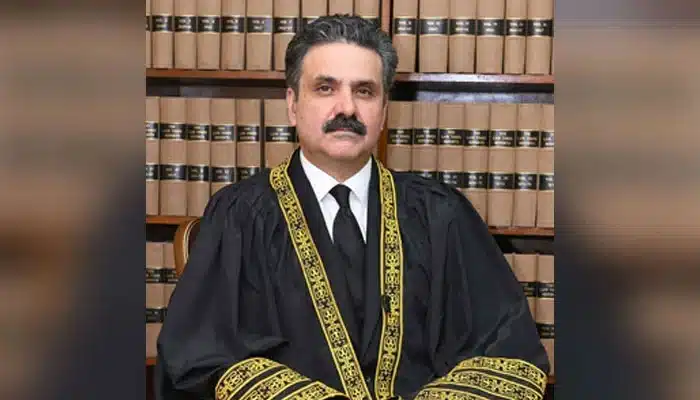Justice Yahya questions PTI’s approach in reserved seats case.
Points out that former ruling party didn’t seek any specific relief.
Judge dismisses SIC’s pleas for not meeting legal requirements.
ISLAMABAD: As the reserved seats saga continues to grip the country’s political landscape, Supreme Court’s Justice Yahya Afridi’s separate note has been issued by the apex court with the puisne judge directing the Election Commission of Pakistan (ECP) to revisit its notification of returned candidates on the reserved seats.
A returned candidate, who declared himself to represent a political party, duly submitted a certificate of nomination and didn’t withdraw the declaration via any written intimation, has to be declared a returned candidate representing the said political party and not otherwise, reads Justice Yahya’s note originally dated August 13, 2024.
The development comes a day after the top court issued the detailed judgment of its July 12 short order which had declared the Pakistan Tehreek-e-Insaf (PTI) eligible for reserved seats.
The 8-5 majority judgment was supported by Justice Syed Mansoor Ali Shah, Justice Munib Akhtar, Justice Muhammad Ali Mazhar, Justice Ayesha A Malik, Justice Athar Minallah, Justice Syed Hasan Azhar Rizvi, Justice Shahid Waheed and Justice Irfan Saadat Khan.
Whereas, Chief Justice of Pakistan (CJP) Qazi Faez Isa and Justice Jamal Khan Mandokhail had a differing order, which was supported by Justice Amin-ud-Din Khan and Naeem Akhtar Afghan — with the latter two issuing a dissenting note on August 3.
The 70-page judgment, penned by Justice Shah, on Monday declared the ECP’s March 1 having no legal value wherein it had denied the Sunni Ittehad Council’s (SIC) plea for allocation of reserved seats and had instead decided to give them to other political parties on the principle of proportional representation.
Continuing on his note, Justice Yahya has said that the returned candidates need to be declared from belonging to a party or otherwise within seven days after “providing an opportunity of hearing to any affected party and, thus, the reserved seats for woman and non-Muslims are to be allotted to all deserving political parties, accordingly”.
SIC doesn’t meet legal pre-requisites
Dismissing the SIC pleas, the judge opined that the party didn’t fulfil the criteria of Articles 51 and 106 of the Constitution which required it to contest and win at least one general seat and submit a list of candidates for the reserved seats.
“A political party has to not only file the list of candidates for the reserved seats but also ensure that its nominee candidates have filed their nomination papers for election to the reserved seats within the time set by [the] ECP. Failure on the part of a political party to fulfil any one of the two conditions stated above, and that too, within the prescribed time fixed by [the] ECP under the law would disentitle them to be allocated the reserved seats,” he remarked.
The judge further pointed out that the SIC didn’t field any candidate in either national or provincial assemblies and since it didn’t win any seat it “cannot seek to include the independent returned members of the respective houses to enhance its strength for the allocation of reserved seats within the contemplation of Articles 51 and 106 of the Constitution”.
The SIC also didn’t submit any list of candidates for reserved seats for women or non-Muslims within the period fixed by ECP, he added.
“Given the above legal infirmities and inactions in taking the requisite steps by SIC, the joining of independent returned candidates would be of no legal avail in respect of enhancing its numerical strength for allocation of reserved seats for women and non-Muslims in the National Assembly and provincial assemblies,” he concluded.
Questions raised on PTI’s approach
Moving on to the Imran Khan-founded party’s approach towards the matter and the said case, the Supreme Court judge accentuated that despite hearings that spanned eight months, the PTI didn’t raise the issue of reserved seats before the court.
He also highlighted that the former ruling party only filed a plea for impleadment as “interveners” — only to assist the court — which lacked any specific prayer seeking a definite declaration in the party’s favour for allocation of reserved seats.
Noting that passing any definite finding regarding the exact number of seats won by PTI in the national and provincial assemblies would not be legally appropriate, the judge reasoned that the PTI didn’t approach the SC seeking such direction.
“Passing a definite finding by this court would amount to invoking suo motu jurisdiction under Article 184(3) of the Constitution,” he remarked.
Justice Yahya’s aforesaid reasons echo with the dissenting note penned by Justice Khan and Afghan in August.
The puisne judge’s arguments regarding the PTI not being a party to the case can be contrasted with the detailed judgment issued a day earlier which had termed the case as “not an ordinary one” and said that the court wasn’t bound by technicalities or procedures — regarding decision on an application of impleadment — as the case concerned revolved around democracy and the fundamental right of the people (the electorate) to choose their representatives.
“The procedural formality of first accepting PTI’s application and then granting it the relief does not carry much weight where the court’s concern is the protection of the right to vote of the people (the electorate) guaranteed under Articles 17(2) and 19 of the Constitution, more than the right of any political party — whether it be SIC or PTI or any other party,” contended the detailed verdict.

